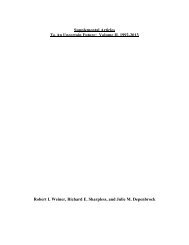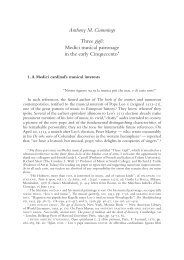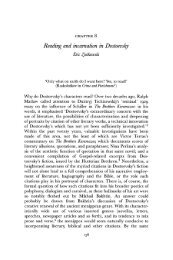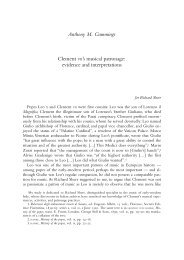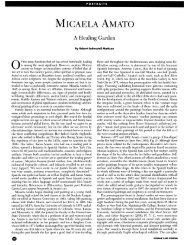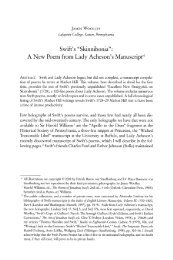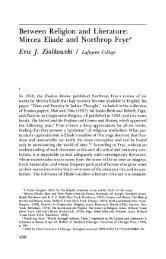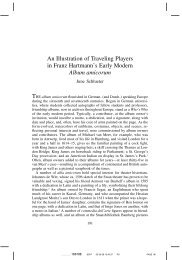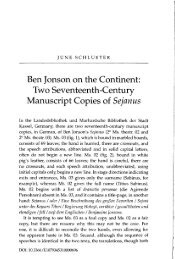courses of instruction - Lafayette College
courses of instruction - Lafayette College
courses of instruction - Lafayette College
You also want an ePaper? Increase the reach of your titles
YUMPU automatically turns print PDFs into web optimized ePapers that Google loves.
FIRST-YEAR SEMINAR<br />
flicts in the twentieth century, but also to<br />
equip each participant with the tools nec<br />
essary to analyze any international con<br />
flict. Topics include causes <strong>of</strong> individual<br />
and collective violence, arms races and de<br />
terrence, and means for prevention or re<br />
duction <strong>of</strong> international conflict. Mr. Pekg<br />
014. Individualism in American Culture,<br />
Character, and Society. The term "individ<br />
ualism" has long been used to describe<br />
one <strong>of</strong> the distinctive qualities <strong>of</strong> Ameri<br />
cans and <strong>of</strong> American culture. Using Alex<br />
is de Tocqueville's Democracy in America<br />
(1840) as the starting point, this seminar<br />
systematically examines expressions <strong>of</strong> in<br />
dividualism in American life, past and<br />
present. Mr. Schneiderman<br />
015. The Folktale in Society: From Beau<br />
ty and the Beast to Big Foot. Fairy tales<br />
are <strong>of</strong>ten thought <strong>of</strong> as amusing reading<br />
for children, but to folklorists, such stories<br />
are serious business. This seminar ex<br />
plores the importance <strong>of</strong> studying fairy<br />
tales in such disciplines as anthropology,<br />
religion, literature, and psychology. The<br />
development <strong>of</strong> fairy tales is traced from<br />
the European oral tradition to their mod<br />
ern expression in Disney stories, horror<br />
films, and supermarket tabloids. Ms. Niles<br />
016. Why Poetry Matters. Dismissed as<br />
either difficult or trivial, poetry still sur<br />
vives all around us. This seminar explores<br />
the social manifestations <strong>of</strong> poetry and<br />
our appetite for it in such phenomena as<br />
poetry slams, subway posters, rap and<br />
oral performance, as well as in more aca<br />
demic forms. Students test definitions <strong>of</strong><br />
poetry against personal reading, listening,<br />
speaking and writing experiences, study<br />
ing how written and oral expressions both<br />
complement and contend with each other.<br />
Ms. Seetch<br />
018. Dealing with Differences: Views<br />
from the Margin. Through readings, film,<br />
and community service, this seminar is an<br />
attempt to step into the experiences <strong>of</strong><br />
people living on the margins <strong>of</strong> United<br />
States society, due, for example, to ethnic<br />
38<br />
ity or economic background. In light <strong>of</strong><br />
historical and other critical assessments,<br />
students rethink their assumptions about<br />
these groups and individuals. Topics in<br />
clude discrimination, privilege, and clas-<br />
sism. Limited to students who engage in a<br />
weekly volunteer experience in the commu<br />
nity, such as a homeless shelter, a soup kitch<br />
en, or a nursing home, which may be arranged<br />
through the <strong>College</strong>'s Community Outreach<br />
Center. Ms. Beckman<br />
019. Adventures in the Contact Zone. Im<br />
migrants, travelers, and students in coed<br />
ucational, multicultural colleges all inhab<br />
it what Mary Louise Pratt calls "contact<br />
zones." How do we construct the cultures<br />
<strong>of</strong> gender, race, class, nationality, sexual<br />
orientation, and generation that organize<br />
our social lives? How do we speak, hear,<br />
read, and write, across cultures? These<br />
questions are applied to readings, interac<br />
tions in the classroom, and experience as<br />
volunteers in the community. Limited to<br />
students who engage in a weekly volunteer ex<br />
perience in the community, such as a homeless<br />
shelter, a soup kitchen, or a nursing home,<br />
which may be arranged through the <strong>College</strong>'s<br />
Community Outreach Center. Ms. Blake<br />
020. Economics <strong>of</strong> Race and Class. This<br />
seminar explores issues relating to the eco<br />
nomic circumstances <strong>of</strong> racial minorities<br />
within the U.S., specifically the rationality<br />
underlying behavior and decisions in ar<br />
eas such as education, politics, housing,<br />
job training, and pr<strong>of</strong>essional develop<br />
ment. The seminar introduces students to<br />
the role economic incentives play in deter<br />
mining social and economic outcomes.<br />
Students engage in a weekly volunteer ex<br />
perience in the community. Mr. Hutchinson<br />
021. Masculinities: Maleness in Contem<br />
porary American Culture. What does it<br />
mean to be a man, manly, masculine? Do<br />
gender and race condition the way we<br />
view masculinity? In journals, essays, and<br />
group presentations, students analyze a<br />
variety <strong>of</strong> texts from ads, cartoons, and<br />
essays in popular magazines to scholarly<br />
studies by sociologists and biologists.<br />
Ms. Byrd, Mr. Martin, Mr. Washington



